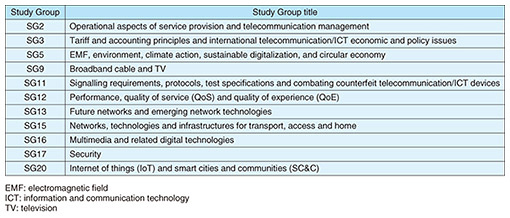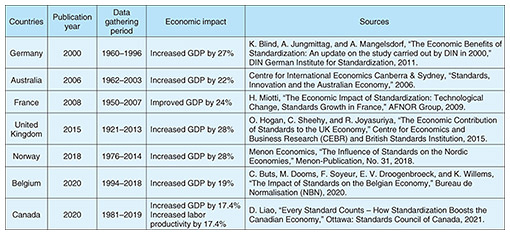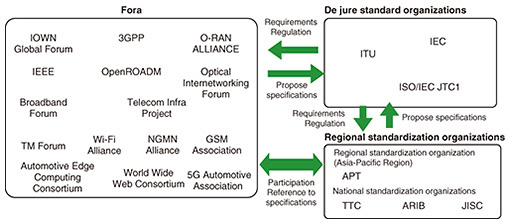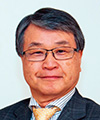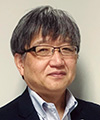 |
|||||||||||||||
|
|
|||||||||||||||
|
Feature Articles: International Standardization Trends Vol. 22, No. 1, pp. 12–17, Jan. 2024. https://doi.org/10.53829/ntr202401fa1 On Publishing Feature Articles on International Standardization TrendsAbstractAs a means of introducing Feature Articles on International Standardization Trends in this issue, this article describes the historical background and economic benefits of international standardization. Since January 2023, Mr. Seizo Onoe has been Director of the Telecommunication Standardization Bureau of the International Telecommunication Union (ITU). The Ministerial Declaration of the G7 Digital and Tech Ministers’ Meeting calls for cooperation in international standardization. This resulted in interest in international standardization in Japan reaching an unprecedented level. Accordingly, this article also introduces recent trends surrounding international standardization and provides an overview of the NTT Group’s efforts in this area. Keywords: international standardization, ITU, standardization office 1. Need for and significance of international standardization1.1 Need for international standardizationVital prerequisites for the success of services in the information and communication field are that the devices needed for these services must be interconnected and operate as designed. This means that the interfaces between terminals, networks, and network operators must be specified. Since information and communication involves a wide range of technologies, it is practically impossible for a single company to provide all the technologies and devices. Thus, it is essential, for example, to standardize physical interfaces and signal conversion protocols. Long time ago, international standardization in the information and communication field was promoted to provide telegraph and telephone services across national borders. Therefore, standardization topics were centered around interface specifications, numbering, and settlement of accounts for international telecommunication services. However, today, the scope of the study for standardization is broadening to include environmental and climate change countermeasures, multimedia, and security. As a reference, the issues studied in the International Telecommunication Union - Telecommunication Standardization Sector (ITU-T), the United Nations specialized agency in charge of international standardization in the telecommunications field, are listed in Table 1.
As information and communication services become more advanced and complex, the need for international standardization has become ever more pressing. To spread and deploy the Innovative Optical and Wireless Network (IOWN), a concept the NTT Group seeks to implement, international standardization activities will also play a pivotal role. 1.2 Economic benefits of international standardizationOne of the benefits of international standardization that first comes to mind may be better interconnectivity, but there are many other benefits: (1) the specification of device interfaces is expected to boost competition among device suppliers, resulting in improved quality and lower prices; (2) the incorporation of standardized technology in many products will boost the expected profits from and efficiency of research and development (R&D); and (3) standardization will establish criteria for quality and safety and contribute to the establishment of a fair competitive environment. While it is difficult to quantify the economic benefits of international standardization, by way of example, some estimates from other countries are listed in Table 2. These should give the reader some idea of just how huge the economic benefits generated through international standardization are.
1.3 WTO agreementsWith a view to maintaining free and fair trade, the World Trade Organization (WTO) put into effect in 1995 the Agreement on Technical Barriers to Trade (TBT Agreement). The agreement obliges member countries to harmonize their mandatory or voluntary standards and conformity assessment procedures with international standards [1]. With the de jure standard defined by ITU and other bodies in mind, WTO also stipulates the Agreement on Government Procurement (GPA), which requires that technical specifications for the performance of goods procured by governments and their related organizations must be based on international standards, if such standards already exist. GPA applies not only to central and local government agencies, but also to their affiliated organizations. NTT (the holding company), NTT EAST, and NTT WEST are listed as applicable organizations in the Annex of the agreement. Therefore, should these three companies procure telecommunications devices that do not conform to international standards, they would risk being accused of violating the WTO agreement. A case in point, although not one involving the NTT Group, is a complaint filed with the WTO’s relevant committee against East Japan Railway Company for violating the above agreement when the company announced the adoption of the Felica e-money system, which was not a de jure standard at the time [2]. While international standardization brings economic benefits, it is also attended by the risk of violating WTO agreements. It is therefore more important than ever to involve ourselves in standardization. 2. Trends surrounding international standardization2.1 Standardization organizationsStandardization organizations can be classified into the following three categories in accordance with their formation, standard development process, and their effective regions. (1) De jure standard organizations: These organizations produce standards in accordance with a formal and clearly stated process. In principle, these standards have their effect across the whole world. According to a WTO agreement, only three organizations fall into this category: ITU, the International Electrotechnical Commission (IEC), and the International Organization for Standardization (ISO). (2) Fora: These organizations are formed by companies interested in a specific field. Although compliance with their standards is limited to the members of each forum, the limited number of participants expedites the development of standards with an appropriate granularity. Typical examples include the 3rd Generation Partnership Project (3GPP) and the Institute of Electrical and Electronics Engineers (IEEE). (3) Regional and national standardization organizations: These organizations produce standards that are applicable only within a specific region or country. They are also used to coordinate policy proposals from each region to de jure standard organizations such as ITU. Representative examples include the European Telecommunications Standards Institute (ETSI), the Asia-Pacific Telecommunity (APT), and national standards organizations in Japan, such as the Telecommunication Technology Committee (TTC) and the Association of Radio Industries and Businesses (ARIB). Each of the three types of standardization organizations has its strengths and weaknesses. Therefore, it is important to maintain a balance among the activities of the three types and coordinate these activities as necessary. A well-known example of working with each of them is to use a forum, which works relatively fast, to establish forum standards then submit them to a de jure standard organization to establish de jure standards. To use this process, it is vitally important to have an accurate understanding of each organization’s situation and establish and maintain channels for collaboration with each of them. 2.2 Ministerial Declaration of the G7 Digital and Tech Ministers’ MeetingAt the G7 Digital and Tech Ministers’ Meeting held in Takasaki, Gunma Prefecture in April 2023, discussions were held on safe and resilient digital infrastructure, and recommendations for international standardization were presented in the outcome document [3]. Some of the recommendations are introduced below.
The G7 ministers’ meeting recognized the importance of international standardization and presented a policy on future cooperation. 2.3 NTT Group’s effortsAs shown in Fig. 1, the main standardization organizations which the NTT Group participates in or is associated with are classified into one of the above organization categories of de jure, forum, and regional/national.
In de jure standard organizations, especially in ITU, we pursue a wide range of activities in fixed-line and wireless networks, environment and operations, and applications and services. Regarding regional standardization organizations, we use APT, the world’s largest body of this kind, to compile proposals from the Asia-Pacific region and submit them to ITU. Within Japan, we are working on national standardization (downstream) of ITU standards at national standardization organizations such as the TTC (see TTC President’s message at the end of this article) and ARIB. For the fora, we have been particularly active in the IOWN Global Forum, of which NTT is one of the founding members, and 3GPP, which formulates and oversees mobile technology standards. Going forward, with a view to making IOWN and a 6G world a reality, we will enhance our activities within each organization and strengthen standardization efforts across the NTT Group to facilitate collaboration among standardization organizations. 3. On publishing the Feature ArticlesMajor events surrounding Japan’s international standardization activities have occurred recently. Mr. Seizo Onoe, who has served as chief technology officer at NTT DOCOMO and chief standardization strategy officer at NTT (the holding company), was appointed as the head of ITU-T (Director of the Telecommunication Standardization Bureau (TSB)) in January 2023 (see TSB Director’s message at the end of this article). The Ministerial Declaration of the G7 Digital and Tech Ministers’ Meeting calls for a cooperative framework for international standardization. These events are generating greater momentum to advance international standardization activities in Japan and raise it to an unprecedented level. To further strengthen the NTT Group’s international competitiveness, NTT is reinforcing the Standardization Office and the collaborative system across the NTT Group. To provide a broad overview of the NTT Group’s international standardization activities and their current status, we included in this issue the following articles on international standardization trends concerning technologies related to fixed-line networks “Standardization Trends in Technologies Related to Fixed-line Networks” [4], those related to wireless networks “Standardization Trends Related to Wireless Communications” [5], those related to environment and operations “Standardization Trends Related to Environmental and Operations Technologies” [6], and those related to applications and services “Standardization Trends Related to Application- and Service-related Technologies” [7]. These articles are authored by those who work at the forefront of international standardization. We hope they will help deepen readers’ understanding and interest in international standardization. Bringing True Value to the World by International Standardization
Seizo Onoe It has already been eight months since I assumed the post of Director of the Telecommunication Standardization Bureau of ITU in January 2023. I would like to express my deep appreciation for the support of everyone, including the Japanese government and the NTT Group, during the election campaign. There are many standardization bodies that work on information and communication technologies (ICTs), and it is becoming increasingly important for them to work together in a way that leverages their respective strengths. ITU”Ēs greatest strength is its global reach, including into developing countries, and we intend to play our role with the awareness of this strength kept uppermost in our mind. Through its standardization work, ITU-T will contribute to ITU”Ēs strategic goals: (1) universal meaningful connectivity and (2) sustainable digital transformation. Standardization brings real value only when the technical standards are widely adopted. The dissemination of technical standards around the world expands the market, which in turn activates the principle of competition and works to lower costs and prices. This leads to a virtuous cycle of further dissemination of standards and brings us closer to the provision of affordable services. The role of the industry in implementing and deploying technical standards is significant. It is my sincere hope that NTT and other organizations in the private sector will continue to develop implementable standards through ITU and promote the dissemination of technical standards, thus support ITU”Ēs activities in bringing value to the lives of people and society worldwide as well as enabling companies to prosper. TTC’s Activities and Contributions to Standardization Activities
Hideyuki Iwata The international rule-making sector for the information and telecommunication field is becoming increasingly diverse as issues and subjects to be handled grow in scope. The sector now encompasses standardization organizations, such as ITU, as well as industrial associations, such as forums and consortiums, and open source communities. To fulfill its role under these circumstances as a standardization organization for domestic discussions, the TTC has strengthened its efforts in the Inter-Industry Innovation Working Party to support cross-technical field and cross-industry activities, in addition to the activities of its existing technical committees that correspond to the organization of ITU-T. This working party provides an environment in which companies and organizations can collaborate to discuss, examine, research, develop, and demonstrate new initiatives. In addition to collaborating with domestic and international standardization organizations, we also cooperate in various ways with organizations in related industries, such as the automotive, medical, and agricultural industries. As an initiative to address social issues, we have been promoting and disseminating ICT utilization and standardization in Southeast Asia for more than 10 years. Our activities in this area have been facilitated by the relationships of trust we have built up with government agencies and other organizations in each country. Finally, while the TTC has continued to work on human resource development, considering social changes and the urgent need to respond to them, we have established a new time-limited advisory group focusing on human resource development to study what specific measures need to be taken. The TTC will also contribute to serving as a standardization organization for domestic discussion, collaboration, and human resource development during the process in which ICTs originating in Japan, including IOWN, are used and discussed to formulate international rules in various industries. References
|
|||||||||||||||









